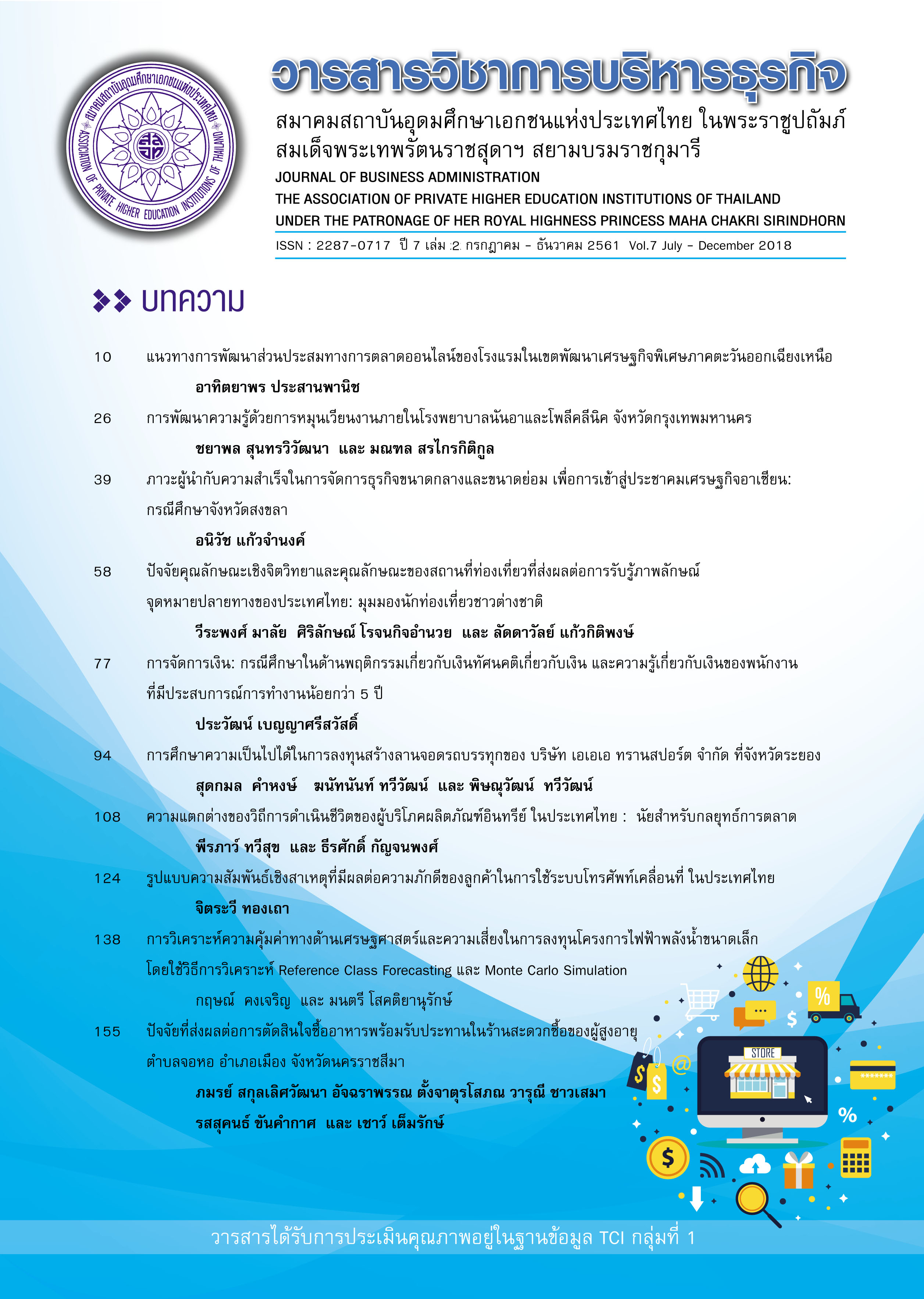การวิเคราะห์ความคุ้มค่าทางด้านเศรษฐศาสตร์และความเสี่ยงในการลงทุน โครงการไฟฟ้าพลังน้ำขนาดเล็กโดยใช้วิธีการวิเคราะห์ Reference Class Forecasting และ Monte Carlo Simulation
คำสำคัญ:
การวิเคราะห์ความคุ้มค่าในการลงทุน, การวิเคราะห์ความเสี่ยง, โครงการไฟฟ้าพลังน้ำขนาดเล็ก, Reference class forecasting, วิธีมอนติคาร์โลบทคัดย่อ
การศึกษานี้มีวัตถุประสงค์เพื่อวิเคราะห์ความคุ้มค่าทางด้านเศรษฐศาสตร์และความเสี่ยงในการลงทุน
โครงการไฟฟ้าพลังน้ำขนาดเล็กโดยประยุกต์ใช้วิธีการวิเคราะห์ Reference Class Forecasting ร่วมกับ Monte
Carlo Simulation ในการวิเคราะห์ต้นทุนและผลประโยชน์ (Cost-Benefit Analysis: CBA) ของโครงการ ซึ่งมี
ตัวชี้วัดที่สำคัญ คือ 1) ค่าเฉลี่ยมูลค่าปัจจุบันสุทธิ ณ ระดับความเสี่ยงที่ยอมรับได้ และ 2) ระดับความเสี่ยงของ
โครงการผลการวิเคราะห์แสดงให้เห็นว่าโครงการไฟฟ้าพลังน้ำขนาดเล็กในกรณีที่ 3 เป็นโครงการที่มีมูลค่าผลตอบแทน
สุทธิสูงสุดและมีความเสี่ยงต่ำที่สุด โดยมีมูลค่าปัจจุบันสุทธิ ณ ระดับความเสี่ยงที่ยอมรับได้ (Risk Acceptable Net
Present Value : R-NPV) เท่ากับ 59.11 ล้านบาท (ณ ระดับโอกาสร้อยละ 80) และมีผลการวิเคราะห์ระดับความเสี่ยง
ของโครงการอยู่ในระดับต่ำมาก
ทั้งนี้การวิเคราะห์คุ้มค่าทางด้านเศรษฐศาสตร์และความเสี่ยงในการลงทุนโดยประยุกต์ใช้วิธี การวิเคราะห์
Reference Class Forecasting ร่วมกับ Monte Carlo Simulation สามารถนำไปประยุกต์ใช้ในการวิเคราะห์ความเสี่ยง
ในการลงทุนโครงการประเภทอื่นๆได้ โดยเฉพาะในการลงทุนโครงการพัฒนาโครงสร้างพื้นฐานของภาครัฐซึ่งมัก
จะเกิดความคลาดเคลื่อนของผลการศึกษาอันเป็นสาเหตุหนึ่งของความไร้ประสิทธิภาพในการบริหารจัดการภาครัฐ

ดาวน์โหลด
เผยแพร่แล้ว
รูปแบบการอ้างอิง
ฉบับ
ประเภทบทความ
สัญญาอนุญาต
บทความที่ลงตีพิมพ์ในวารสารวิชาการบริหารธุรกิจ สมาคมสถาบันอุดมศึกษาเอกชนแห่งประเทศไทยต้องเป็นบทความที่ไม่เคยได้รับการตีพิมพ์เผยแพร่ หรืออยู่ระหว่างการพิจารณาตีพิมพ์ในวารสารอื่นๆ การละเมิดลิขสิทธิ์เป็นความรับผิดชอบของผู้ส่งบทความโดยตรง

